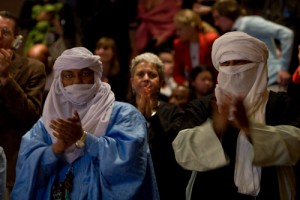 The efforts to draft a specific instrument dealing with the protection of indigenous peoples worldwide date back over several decades. In 1982 the Economic and Social Council (ECOSOC) established the Working Group on Indigenous Populations with the mandate to develop a set of minimum standards that would protect indigenous peoples.
The efforts to draft a specific instrument dealing with the protection of indigenous peoples worldwide date back over several decades. In 1982 the Economic and Social Council (ECOSOC) established the Working Group on Indigenous Populations with the mandate to develop a set of minimum standards that would protect indigenous peoples.
The Working Group was established as result of a study by José R. Martinez Cobo on the problem of discrimination faced by indigenous peoples throughout the world. The study outlined the oppression, marginalization and exploitation suffered by indigenous peoples.
The Working Group submitted a first draft declaration on the rights of indigenous peoples to the Sub-Commission on the Prevention of Discrimination and Protection of Minorities, which was later approved in 1994. The Draft was sent for consideration to the then U.N. Commission on Human Rights for further discussion and if it was deemed to be appropriate, to approve the proposed declaration before its submission to ECOSOC and the U.N. General Assembly.
The process moved very slowly because of concerns expressed by States with regard to some of the core provisions of the draft declaration, namely the right to self-determination of indigenous peoples and the control over natural resources existing on indigenous peoples' traditional lands.
The need to accommodate these issues led to the creation, in 1995, of the open-ended inter-sessional working group to consider and elaborate on the 1994 draft declaration. The open-ended working group hoped that the instrument would be adopted by the General Assembly within the International Decade of the World's Indigenous People (1995-2004). Since this did not take place, the mandate of the working group was extended by the U.N. Commission on Human Rights into the Second International Decade of the World's Indigenous Peoples (2005-2015).
In 2006, revisions to the human rights machinery within the United Nations resulted in the replacement of the U.N. Commission on Human Rights with the U.N. Human Rights Council. On 29 June 2006, the United Nations Human Rights Council adopted the Declaration on the Rights of Indigenous Peoples.
On 28 December 2006, the Third Committee of the General Assembly (Social, Humanitarian and Cultural) adopted a draft resolution to defer consideration and action on the United Nations Declaration on the Rights of Indigenous Peoples by the General Assembly, with the aim of concluding consideration of the Declaration before the end of its current sixty-first session.
Under a revised draft resolution, whose main sponsor was Peru, with a number of European and Latin American countries listed as co-sponsors, the full text would have been adopted by the Assembly in relatively short order.
But an initiative led by Namibia, co-sponsored by a number of African countries, resulted in the draft being amended. In its new form, the draft would have the Assembly decide “to defer consideration and action on the United Nations Declaration on the Rights of Indigenous Peoples to allow time for further consultations thereon”. Furthermore, the Assembly would also decide “to conclude consideration of the Declaration before the end of its sixty-first session”.
Finally, on 13 September 2007, the Declaration on the Rights of Indigenous Peoples was adopted by a majority of 144 states in favour, 4 votes against (Australia, Canada, New Zealand and the United States) and 11 abstentions (Azerbaijan, Bangladesh, Bhutan, Burundi, Colombia, Georgia, Kenya, Nigeria, Russian Federation, Samoa and Ukraine). Click here to view the voting record.
Since adoption of the Declaration, Australia, New Zealand, United States and Canada have all reversed their positions and expressed support for the Declaration. Colombia and Samoa have also endorsed the Declaration.
During the Durban Review Conference in April 2009, 182 States from all regions of the world reached consensus on an outcome document in which they “ Welcome[d] the adoption of the UN Declaration on the rights of indigenous peoples which has a positive impact on the protection of victims and, in this context, urge[d] States to take all necessary measures to implement the rights of indigenous peoples in accordance with international human rights instruments without discrimination…” (UN Office of the High Commissioner for Human Rights, Outcome document of the Durban Review Conference , 24 April 2009, para. 73).
For the Meetings Coverage on 13 September 2007 (GA10612), please click here
For more information click here
 Welcome to the United Nations
Welcome to the United Nations